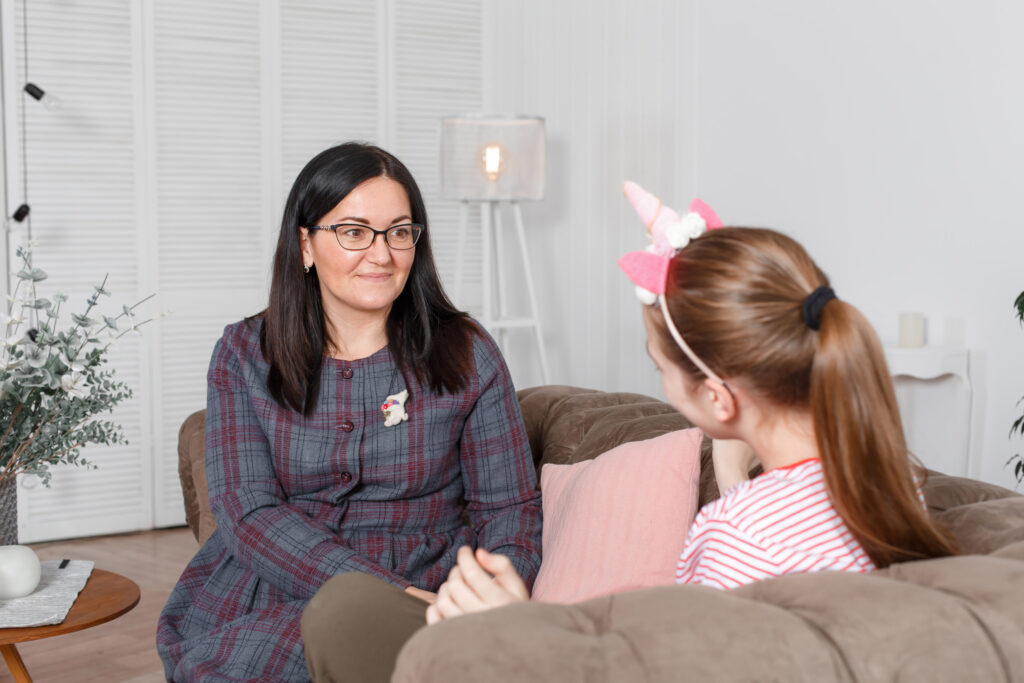
If you are separating or divorcing, it is understandable that your children will be worried, particularly if you are trying to agree arrangements for their future. They are very likely to have their own thoughts and feelings and will probably want you to know about them – but might not be sure how to tell you. Even very young children like to know what is happening and, when they are old enough, to be listened to as part of the decision-making. They can be worried about telling you something directly in case they appear to be “taking sides”. Allowing them to have a voice can make them feel like a constructive part of the process of your separation.
If you are using family mediation, your children can do this by taking part in child-inclusive mediation (CIM).
What is child-inclusive mediation?
Child inclusive mediation is a process that allows children to speak with a specially qualified CIM mediator or child consultant, such as those here at Family Matters, and discuss their feelings, thoughts and hopes for their future when their parents have separated or divorced. After meeting with the children, the mediator may be able to feed back to their parents in a separate meeting – provided the children have given their permission for this. The parents will listen to and include the children’s ideas when they make arrangements for their future.
Child-inclusive mediation can be carried out online or in our offices.
I’m a parent – should I worry about child-inclusive mediation?
No – not at all. This process cannot take place without both parents giving their permission. Research indicates children manage their parents’ separation better if they have age-appropriate information about what is happening and how their lives will change. As a parent, you will want to know what your children think and how they feel. You might not be able to ask them – and they might not be able to tell you. Child mediators undertake specific training relating to all child mediation issues and how best to engage and listen to children so they can talk about sensitive issues.
The overriding priority for all child mediators is to ensure that the children feel heard and listened to and can share the information they wish with their parents.
Do parents have to agree that their children can attend child-inclusive mediation?

Yes. At Family Matters, we encourage parents to think about allowing children over the age of 10 to take part in the CIM process. However, both parents must agree before the children are invited to speak to a CIM mediator, and, as with all invitations, the child can decide they want to turn it down and not take part in the CIM.
You will be informed of child-inclusive mediation at your individual MIAMs and will be asked for your thoughts at your first mediation meeting. Sometimes, child-inclusive mediation may not be appropriate, for example where a child is involved with several other agencies, or where children services or counsellors are involved. In these circumstances CIM will not be helpful for your children.
In most cases, you will be encouraged to think seriously about CIM, and if you both agree that your children should be invited, your mediator might then ask you both to:
- confirm that you will respect the views of your children
- think about how you might use any feedback in your discussion
- think about what your reaction might be to certain feedback – as it may be hard to hear
- try to tell your children about child mediation together. Both parents saying the same thing will help your children to understand that you are supportive and willing to listen to how they are feeling and what they want to change or stay the same
How will the child-inclusive mediation take place?
Once you have given permission for the mediation to go ahead, and the mediator agrees that it should, the mediator will contact your children directly inviting them to a meeting and explaining what it is all about and how it will work. This could be by letter, email, text or WhatsAPP. If your children do not want to take part, they do not have to, it’s their decision.
Child-inclusive mediation meetings are informal and held in an age-appropriate manner. Children will never be asked to make a choice between mum and dad. They will be asked open questions that are designed to inform the mediator of their feelings and hopes. Here at Family Matters, we have found that our sessions with children have been invaluable in many cases and have often been very useful to parents, who may simply not have realised how their children were feeling and what they were thinking.
Sessions are arranged around the needs of the children, after discussion with the parents. If there is more than one child, the children sometimes want to see a mediator together, at least to begin with. A joint session also helps the mediator to gain an understanding of how the children communicate. If one child is very quiet and the other chatty, the mediator will try to negotiate to see the quieter child alone, if it is felt that they are confident enough to participate in such a meeting.
Child mediators are independent and have no agenda. Many families have told us that child-inclusive mediation is a positive experience for the whole family and that children can feel empowered to be part of the process. Parents say that it has helped them make the right decisions for the future.

What happens after my children have met the CIM mediators?
Mediation with your children is confidential. However, we can feedback to you if your children give their permission. You may find that you hear things that your children have not said to you before, and you may find this feedback difficult to hear. However, if you try to be objective, you may be able to use the information you gain to help you to make better choices for your children’s future, or maybe just do something in a different way.
You will not be given any of the notes that the mediator took during the child mediation sessions – unless this is directed by the court – as these are confidential, but you can take notes yourself during the feedback session.
What happens if you are not able to get feedback?
Where we can, we will try to encourage a child to give feedback to their parents. Ultimately however, it’s the child’s decision what can and cannot be shared with their parents. It is very rare that children say they don’t want to share anything with their parents. Children like being asked and being part of the decision-making without being responsible for the decision.
What experience of child-inclusive mediation does Family Matters have?
Family Matters has extensive experience in child-inclusive mediation. We have two trained CIM consultants, Juliette Dalrymple and Jane Smith, and have been carrying out CIM since 2004. On average we carry out approximately one CIM per month.
Our model is unique as we use two mediators: one for the parents and one for the children. This means that children have their own person to speak for them in the feedback session.
This model was used in the Listening to Children Matters (L2C) project, for which we received Ministry of Justice funding for three years. This project meant that we were able to build up extensive knowledge and expertise in child-inclusive mediation. In the project, we saw over 600 families.
What is the CIM process?
The first mediation is a preparatory meeting between the parents where we talk about how they will react to different things the children might say. This meeting can be joint mediation (both people in the same room) or a shuttle mediation, where both people are in separate rooms.
The child consultation takes place with the child. The CIM mediator will see the child with a parent or relative to begin with so that they can explain the boundaries and expectations (for example safeguarding and confidentiality) so that if the child has questions afterwards, the adult can respond. The CIM then takes place.
In the feedback meeting, both the parents and the child’s mediator are present – the parents’ mediator to manage the meeting and the CIM mediator to be the voice of the child. There is a requirement that both parents hear the feedback from the child’s meeting at the same time. This is a joint meeting either online or in person. This is because we feel that it is vital that both parents hear the same information at the same time.
Once the feedback is given, the mediation can change to a shuttle meeting, where both parents go into separate online or actual meeting rooms.
A summary is prepared after each mediation, but it does not include any of the feedback from the child. Only the outcome of the mediation and the decisions made. Parents are often surprised to hear what their children are thinking and how much they know about the separation.
Our CIM mediator, Juliette, said: “A good CIM stays with you as children trust the mediator with their thoughts and feelings and when parents genuinely listen and hear their children, it can make an enormous difference to their children’s life”
Case Study
David, aged 12, was not spending time with his dad who lived some way away and travelled once per month to spend time with David. When David refused to see his dad, this made him angry and he blamed David’s mum, thinking she was alienating him. David’s Mum was frustrated and angry, feeling blamed for how David was reacting.
In the first meeting, both parents agreed to the CIM process, and it was agreed that a CIM mediator would listen to David so he could talk about his thoughts and feelings. Within the session, David talked about wanting to spend more time with his friends but also about ways in which he could spend time with his dad around that.
This information was shared with the parents in the feedback meeting.
The parents agreed to arrange to meet for a coffee with David and his younger sister so that David could see they were trying to work together and could be together in the same place without an argument, even if it was only for a short time. The parents planned a series of short meetings so that David could spend more time with his dad and younger sister.
At the follow-up meeting, both parents confirmed that they had kept to arrangements they had agreed and David was now spending time regularly with his dad but was able to work this around spending time with his friends.



